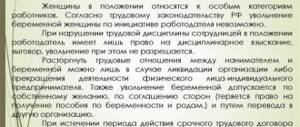Staff reductions, including in the Ministry of Internal Affairs, imply a reduction in the number of employees for a specific position. This procedure is carried out only if there are serious grounds and in compliance with strict procedures (Federal Law No. 3 “On the Police” of January 7, 2011, Federal Law No. 342 of October 30, 2011). The possibility of reductions is also provided for in Art. 58 Regulations on service in the Ministry of Internal Affairs N 4202-I.
The legal side of this procedure is determined by the following provisions of the Labor Code of the Russian Federation:
- Art. 81, part 1, clause 2 (dismissal at the initiative of the employer, about staff reduction).
- Art. 178 (guaranteed payment of severance pay upon dismissal on this basis).
- Art. 179 and art. 261 (on the advantages of remaining at work during staff reductions).
- Art. 292 (obligation to properly warn employees about layoffs).
As a standard, the general procedure in force for staff reductions in civil organizations is applied, the same for all categories of employees, including retirees.
Legal basis
The procedure for labor relations in the structure of the Ministry of Internal Affairs is regulated by various legal norms and laws. These include the Labor Code and the Federal Law “On the Police,” as well as current amendments. These legal norms complement each other. Employees of the Ministry of Internal Affairs, like any citizens, are subject to the country's Constitution. The police officer enjoys all the rights and freedoms defined in it. When dismissing from the Ministry of Internal Affairs, the following legal acts and articles are taken into account:
- clause 2, part 1, art. 81 of the Labor Code - this article allows you to terminate the employment relationship due to a reduction in the number of staff;
- Article 179 of the Labor Code contains a list of categories that are given the advantage of remaining at work;
- Article 178 of the Labor Code guarantees the payment of all monetary compensation due to dismissal due to reduction, in addition to payments made on other grounds;
- Article 292 of the Labor Code explains the legal procedure for dismissal;
- Decree of the Government of the Russian Federation No. 716 regulates the reimbursement of funds spent related to the transportation of dismissed workers;
- Decree of the Government of the Russian Federation No. 941 supplements the information on the calculation of benefits based on length of service;
- clause 2 art. 80 of the Labor Code considers the grounds related to dismissal due to reorganization or disbandment of units at the suggestion of higher management;
- Articles 57 and 58 of the Regulations on Service in the Ministry of Internal Affairs list the reasons why an employee can be legally dismissed from the internal affairs bodies.
In addition, there are a number of articles and clauses in legislative documents, but the listed laws allow you to obtain comprehensive information on the various nuances of dismissal. If you carefully study the legal framework, you can replace that the procedure for laying off internal affairs workers is no different from dismissing workers in other fields of activity. More important here are the points that guarantee fair payments of benefits and compensation and ensure further employment.
What payments am I entitled to if my position is made redundant?
The priority form of providing permanent housing to employees of the internal affairs bodies of the Russian Federation dismissed from service (retirees of the Ministry of Internal Affairs of Russia) is the provision of social benefits certified by state housing certificates [3], which is determined by Decree of the President of the Russian Federation of June 28, 1999 No. 825 “Issues of providing housing employees of the internal affairs bodies of the Russian Federation, the State Fire Service of the Ministry of the Russian Federation for Civil Defense, Emergencies and Disaster Relief, institutions and bodies of the penal system of the Ministry of Justice of the Russian Federation, as well as citizens dismissed from service from the above mentioned bodies, services and institutions."
We recommend reading: Kbk personal income tax to return from the budget 3 personal income taxes in 2020
Termination of an employment contract
The main provisions allowing to terminate an employment relationship with a police officer are defined in the Decree of the Government of the Russian Federation 4202-I dated December 23.
92, current for 2021. The grounds for staff reduction are determined by conditions that contribute to the dismissal of a number of police officers due to the removal of certain positions from the staffing table. The reasons leading to a reduction in the number of staff are determined by the top management of the structure, which is not obliged to bring them to the attention of the staff being reduced. Only the Ministry of Internal Affairs or the President has the right to decide questions about the number of employees and the type of positions, but within their competence.
Most often, the decision on the number is made when reorganizing individual units or the entire system, joining or separating various departments into a separate structure. Thus, for example, in 2011 the police were reorganized into the police.
The reduction may be due to a decrease in the crime situation in various places, optimization of the work process, or the political situation. But if an employee wants to go to court about illegal layoffs, the court will not discuss the reasons and grounds, but will only consider the legality of the procedure.
According to Article 58 of the Federal Law of the Russian Federation, employees can be dismissed from the ranks of the Ministry of Internal Affairs on the following grounds:
- own initiative;
- reaching the age limit or length of service;
- expiration of the contract;
- disease;
- failure to pass certification or recertification;
- conscription into the Armed Forces;
- violation of labor activity;
- conviction by court decision;
- provision of knowingly false documents and information about oneself when applying for a job;
- committing immoral acts;
- staff reduction.
The last item on the list has an additional explanation indicating dismissal due to the liquidation or reorganization of the internal affairs structure, if it is not possible to use the employee in alternative units of the Ministry of Internal Affairs. This also applies to the category of persons working under a contract.
But the pitfalls when reducing the salary of certified employees of the Ministry of Internal Affairs working under a contract are that, according to the law on service in the ministry, namely Article 82, it is permissible to terminate the contract due to the impossibility of transfer or refusal of the person being reduced to transfer to another position in the Ministry of Internal Affairs. There is no need to wait until the contract expires.
What payments are due upon dismissal from the Ministry of Internal Affairs?
- persons of ordinary and commanding staff of internal affairs bodies, the State Fire Service, institutions and bodies of the penal system, dismissed from service due to age, illness, staff reduction or limited health - in the amount: for service less than 10 calendar years - five monthly salaries, with length of service from 10 to 14 calendar years inclusive - 10 monthly salaries, with length of service from 15 to 20 calendar years inclusive - 15 monthly salaries and with length of service over 20 years - 20 monthly salaries.
Reduction procedure
Based on the Law “On Service in Internal Affairs Bodies” and changes in certain legislative acts of the Russian Federation, when the number of positions is reduced, the boss is obliged to notify the employee of his upcoming reduction.
In this case, the notification itself must be in writing, and the dismissed person must personally sign for familiarization with it. A police officer is notified of the reduction of his position no later than two months before dismissal. A redundant employee may be temporarily assigned to the authority of the Ministry of Internal Affairs, but for a period of no more than two months. At this time, periods of incapacity and vacation are not taken into account. Such an employee is also subject to incentive and disciplinary measures; he is provided with cash payments in the amount of his salary with all allowances.
After the order to reduce police officers is issued, they are given a referral to undergo the Military Medical Commission (MMC), which determines the suitability of the employees. The results of the IHC are taken into account when determining the basis for dismissal and the proposed positions.
A redundant police officer must be offered an alternative to serving. An employee can be transferred to a job that matches his qualifications. This can be either an equivalent, lower or higher position. In the first two cases, the amount of his salary should not be reduced, and in the third, it should be increased, if this is provided for by the salary schedule.
To move to a higher position, you will need to pass a certification or pass a competition, but this does not apply to people in the personnel reserve. If the person being laid off refuses to take another position or there is no position, then after two months he is fired. On the last day, a full financial settlement must be made with him and his work book returned.
Thus, the main key positions during reduction are:
- delivery of written notice two months in advance against receipt;
- passing the IVC;
- conversation between a superior and a person who has been laid off;
- offering all available vacant positions;
- issuance of an order and submission for dismissal;
- full payment.
How to prepare a written order for dismissal due to reduction
Today there are no requirements to issue orders using unified forms. When drawing up a document, adhere to the following basic rules:
- indicate the place of issue of the order, date, registration number;
- justify the reason for the need for this order;
- clarify the list of dismissed employees, fully indicating last names, first names, patronymics, structural units where they serve;
- date of dismissal;
- signature of the head of the relevant body of the Ministry of Internal Affairs.
Entitled payments
Upon dismissal, each laid-off employee has the right to receive compensation.
Its size is the average monthly salary. If there is unused vacation, then it must also be compensated. But severance pay is paid only when the former employee has not found a new job and registered with the Employment Center within two weeks after the date of dismissal. According to the law “On Social Guarantees for Employees of the Ministry of Internal Affairs,” persons who have worked in the authorities for more than twenty years are paid a one-time allowance upon dismissal in the amount of seven salaries, and those who have served less than this period are paid two average salaries. If the employee also has government awards or an honorary title, then another payment is given in addition.
If desired, a police officer who has been laid off can take advantage of a one-time leave for the entire period of service in the Ministry of Internal Affairs for personal reasons, lasting thirty days, with pay retained. A retired police officer with more than twenty years of work experience has the right to medical care in special hospitals of the Ministry of Internal Affairs, as well as to receive a voucher to a sanatorium with a fifty percent discount once a year. After dismissal, an employee who has the right to wear a uniform, upon application, receives clothing for personal use or its cash equivalent.
If a job is not found, the former police officer must go to the Employment Center to be recognized as unemployed and receive payments. For 2018 in Russia, the largest amount paid for unemployment is 4.9 thousand rubles, and the smallest is 850 rubles.
If at the time of dismissal an employee is entitled to a pension, then he can receive it the very next day after dismissal. There is a provision thanks to which an employee dismissed from the Ministry of Internal Affairs can get a job as a civil servant in civil organizations with or without a competition.
Consultation with a lawyer
Good afternoon. My name is Roman, I would like to find out from you about payouts upon dismissal from the Ministry of Internal Affairs. On 07/08/2011 I was laid off under clause E of Art. 58 of the regulations on service in the internal affairs department. At the same time, I was paid severance pay and salary for the time worked in the last month. Part 13 of salary. I took a vacation, but they didn’t pay for it. Part of the quarterly bonus. And 1800 rub. They said they would pay for a year, every month. After which in August I was credited with 13 thousand rubles. Why I didn’t know, there wasn’t 1800. In September I went to the accounting department and found out that it was 13 thousand rubles. transferred for uniforms?! whether they really relied on me or not, I didn’t know. 1800 were promised at the beginning of October and they still haven’t arrived.
Preferential categories of employees
Dismissal of persons on vacation or temporarily disabled is not permitted. But there is a caveat here that staff reduction is possible, but only with the complete liquidation of the institution. When making a decision to lay off an employee, the degree of usefulness of his work activity is first considered. With equality, the law gives preference to socially disadvantaged categories of people. These include:
- women expecting the birth of a child (regardless of the stage of pregnancy);
- single mothers or fathers who are raising a child who has not reached the age of majority;
- guardians or single parents who are dependent on a disabled child;
- employees who have three or more minor children and are the only breadwinners;
- employees who received combat injuries or have continuous work experience of more than twenty years;
- workers undergoing training to improve their skills at training centers of the Ministry of Internal Affairs.
Wrongful dismissal
If the legality of dismissal is violated, then the employee’s reinstatement in his position if he goes to court is a matter of time. After a positive decision of the court, the Ministry of Internal Affairs will be obliged not only to reinstate the employee in his position with the same salary and all bonuses, but also to pay him compensation. Its size is calculated from the amount of wages for each day of forced absence. Also, at the request of the employee, the court can satisfy his moral claim. Typical mistakes when abbreviating include :
- After the termination of the reduction procedure, the employment service was not notified. Subject to compliance with the laws, the employment service is notified of the planned reduction two months before the actual action, and if the reduction is massive, then this period increases to three months.
- After the dismissal order was issued, the position being reduced remained on the staff list. It would be correct to immediately revise and approve a new staffing table when issuing a reduction order.
- Unfair dismissal of an employee, that is, the dismissed person believes that he should have been retained and another employee should have been laid off. That is why it is so important to take into account the preemptive right when dismissing.
- The worker was not notified two months in advance of his layoff. To exclude this clause, the requirement at the legislative level for the personal signature of the employee on the notification has been adopted. If the employee refuses to sign it, a report is drawn up.
- Not all possible positions are offered. Job offers to employees must be made in writing and signed by the employee.
When challenging their layoffs, workers often point out that the procedure is fictitious, that vacancies are hidden, or that deadlines are not met. But if all actions are carried out in accordance with legal and regulatory acts, then the court will reject such a claim.











